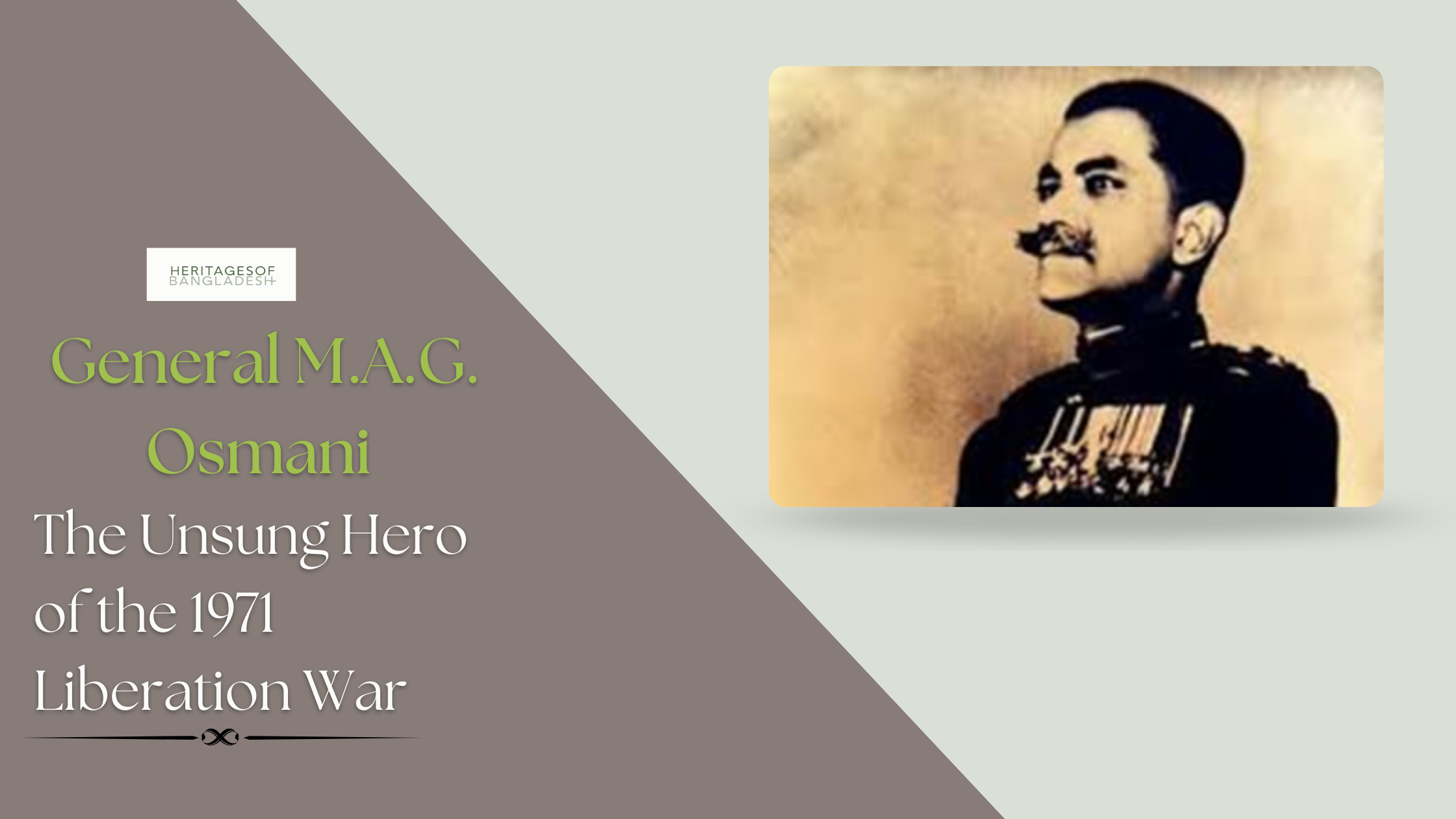When we think of Bangladesh’s Liberation War of 1971, certain names like Bangabandhu Sheikh Mujibur Rahman, Tajuddin Ahmad, and other political leaders often dominate the spotlight. While their roles were undeniably monumental, there were figures who, though less celebrated, played crucial roles in ensuring Bangladesh’s freedom. One such figure is General Muhammad Ataul Gani Osmani, fondly referred to as the “Father of the Bangladesh Armed Forces.” Despite his pivotal leadership in the war, General Osmani remains an unsung hero in the narrative of Bangladesh’s independence.
Who Was General M.A.G. Osmani?
General Muhammad Ataul Gani Osmani, born on 1st September 1918 in Sylhet, was a career military officer with a stellar track record in the British Indian Army and later the Pakistan Army. Known for his strategic acumen and disciplined personality, Osmani retired from the Pakistan Army in 1967 after serving for 23 years. However, his retirement did not mark the end of his military journey. When Bangladesh’s call for independence grew louder, General Osmani emerged as the leader the country desperately needed.
His Role in the Liberation War
When the war broke out on 26th March 1971, following Pakistan’s brutal crackdown, Bangladesh faced an unprecedented crisis. While the political leadership rallied support internationally, the immediate need was organizing the Mukti Bahini—Bangladesh’s guerrilla forces—into an effective and organized army. It was General Osmani who undertook this immense responsibility.
1. Commander-in-Chief of Bangladesh Forces
On 12th April 1971, M.A.G. Osmani was appointed as the Commander-in-Chief of the Bangladesh Forces. He took charge of organizing a ragtag group of freedom fighters into a disciplined and structured military force. His experience and leadership gave the Mukti Bahini the direction and structure it needed to face the mighty Pakistani military.
2. Creation of Sector Command Structure
General Osmani’s most remarkable contribution was the division of the war front into 11 sectors, each led by competent sector commanders. This strategic decision allowed for better coordination, efficient troop movement, and localized operations. It decentralized the war effort while maintaining a central command under Osmani’s leadership.
Osmani also introduced guerrilla warfare tactics, which played a decisive role in destabilizing the Pakistani forces and winning battles in crucial areas.
3. Leadership in the Joint Command
As the war progressed and the Indian military extended its support to the Mukti Bahini, General Osmani ensured seamless cooperation between the two forces. He played a key role in formulating the Joint Command structure, which allowed Indian troops and Bangladeshi forces to operate under a unified strategy.
Why Was Osmani Kept Aside at the Signing Ceremony?
Despite his central role in the Liberation War, General Osmani was notably absent during the formal signing of Pakistan’s surrender on 16th December 1971 at the Racecourse Ground (now Suhrawardy Udyan). The surrender document was signed by Lieutenant General A.A.K. Niazi of Pakistan and Lieutenant General Jagjit Singh Aurora of the Indian Eastern Command, with no Bangladeshi commander formally involved in the ceremony.
This exclusion of Osmani, who was the Commander-in-Chief of the Bangladesh Forces, has sparked debates and discussions among historians. The reasons behind this decision include:
- India’s Strategic Role: India played a significant role in the Liberation War, particularly in its final stages. The Indian Armed Forces were responsible for executing large-scale military operations that hastened Pakistan’s surrender. As a result, the signing ceremony symbolized India’s leadership in orchestrating the final victory.
- International Recognition: At the time, Bangladesh had yet to achieve formal international recognition as an independent state. The Indian military’s presence at the signing ceremony lent diplomatic weight and legitimacy to the liberation process on the global stage.
- Osmani’s Personal Stance: It is believed that Osmani declined to be directly involved in the ceremony due to his firm belief that the Bangladeshi forces should have played a greater and more visible role in the final victory.
While his exclusion remains a contentious issue, it is important to note that Osmani’s contributions were not diminished by this symbolic act. His leadership throughout the war ensured that Bangladesh’s independence was not merely a result of external intervention but a product of the resilience and sacrifices of its own people.
The Unsung Sacrifices
While Osmani was commanding the war effort, he faced numerous challenges. There were shortages of resources, logistical hurdles, and an immense psychological burden. Yet, he remained steadfast, often working behind the scenes to ensure Bangladesh’s military operations were both effective and strategically sound.
Despite his monumental efforts, General Osmani remained a humble leader, shunning the spotlight even after Bangladesh’s victory. He did not seek recognition or rewards for his role, focusing instead on rebuilding the armed forces of the newly independent nation.
Why Is He Overlooked?
There are several reasons why General Osmani remains underappreciated:
- Lack of Publicity: Unlike political figures, military leaders often work behind closed doors. General Osmani’s work, though crucial, was not always visible to the public.
- Focus on Political Leadership: After independence, much of the historical narrative focused on political leadership, sidelining the military contributions.
- Humble Nature: Osmani’s personal humility and reluctance to claim credit meant that his contributions often went unnoticed.
Legacy of General Osmani
While his role may not always be highlighted, General M.A.G. Osmani’s contributions live on in the form of a free and sovereign Bangladesh. He laid the foundation of the Bangladesh Armed Forces, turning a group of freedom fighters into a disciplined and capable military.
In recognition of his role, Osmani was posthumously honored with the title “Bangabir” (Brave Son of Bengal), but his legacy deserves even greater recognition in history books, museums, and the hearts of every Bangladeshi.
Conclusion
General M.A.G. Osmani was not just a military leader; he was a visionary who understood the importance of organization, strategy, and collaboration in achieving Bangladesh’s independence. His leadership in the Liberation War was nothing short of extraordinary, yet his name often fades into the background when we recount the history of 1971.
As we remember the sacrifices and leadership that brought us freedom, it is time we give General Osmani his rightful place in history. He is not just the unsung hero of the Liberation War—he is one of the architects of Bangladesh’s independence. Let us celebrate his life, honor his contributions, and ensure his story continues to inspire generations to come.

